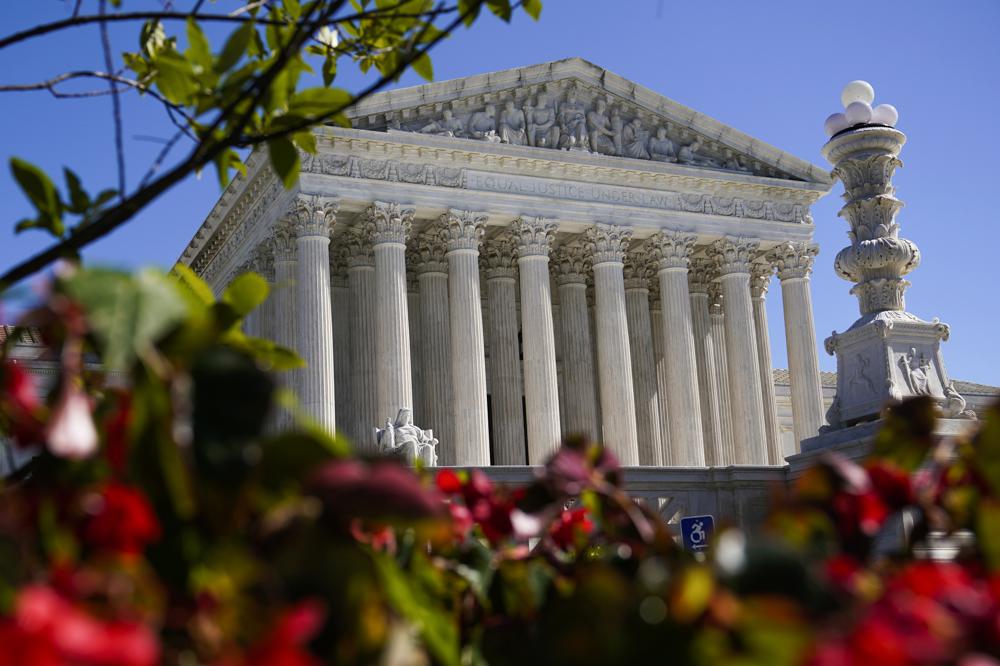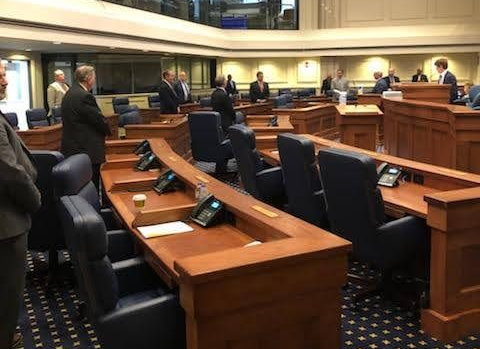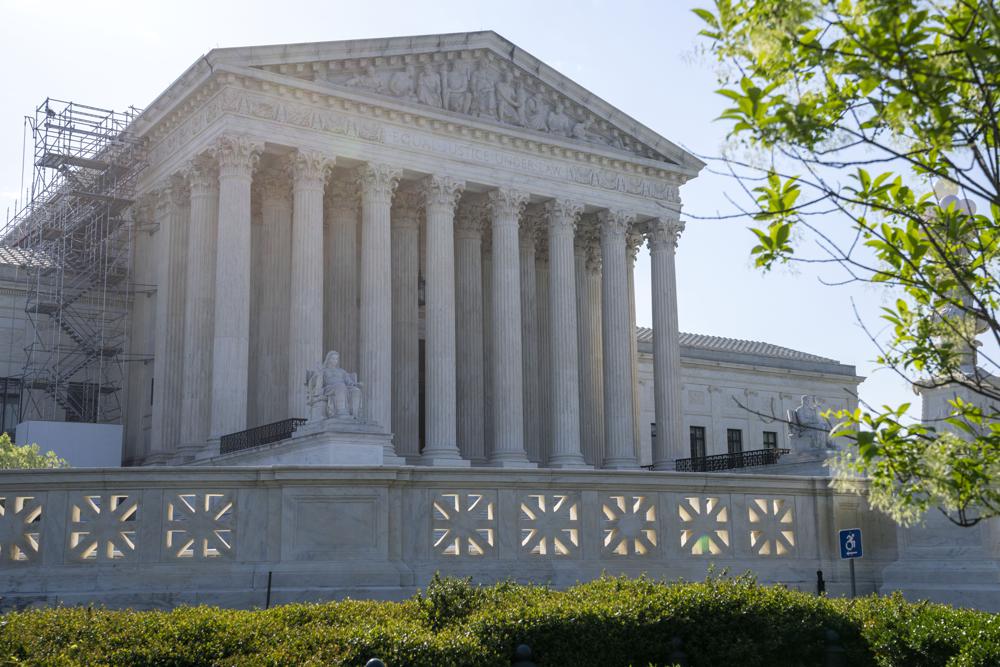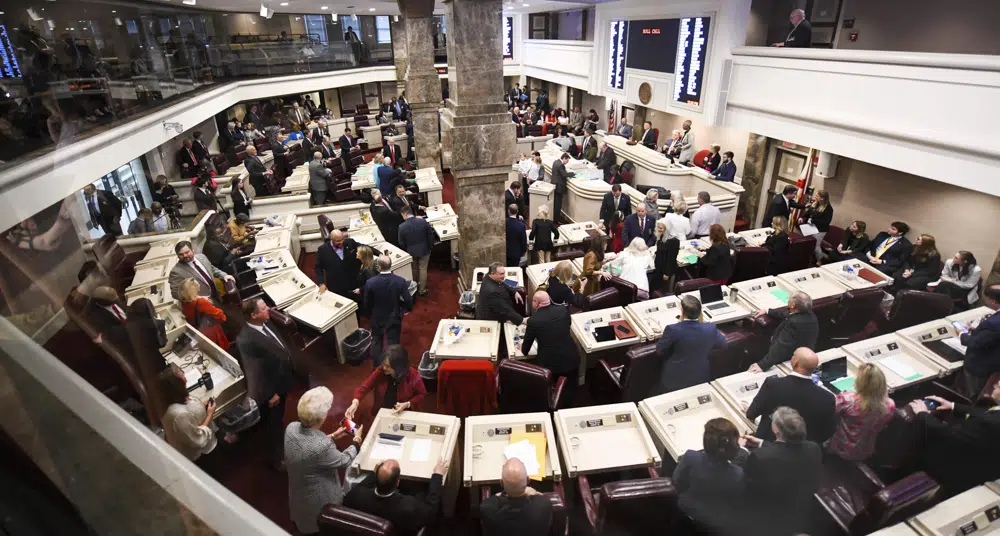Supreme Court to rule soon on Alabama Congressional Districts

Alabama’s Congressional Districts could be thrown into chaos in the coming weeks if the U.S. Supreme Court upholds a lower court decision in a case challenging the 2021 congressional redistricting by the Alabama Legislature. The Supreme Court decision in the case of Milligan versus Merrill will be announced in the next few weeks. This decision could have a wide-ranging impact on when states must draw minority-majority districts. The plaintiffs claim that since Blacks are over 27% of the population of Alabama, the Legislature should have drawn two majority-minority districts, not one (Alabama’s Seventh Congressional District). A federal three-judge panel ruled for the plaintiffs and ordered the Legislature to redraw the districts. The state appealed to the U.S. Supreme Court, which voted 5 to 4 to stay the lower court decision until they hear and decide the case. Alabama Attorney General Steve Marshall said that the Supreme Court granted the State’s motion, allowing the Alabama Congressional District map as drawn by the Legislature in November to stand for now. “I’m gratified that the Supreme Court has stepped in to halt the district court’s order, which would have resulted in a congressional map that would have unconstitutionally divided Alabamians based on race,” Marshall stated. “As we have explained throughout this litigation, Alabama’s 2021 plan is an ordinary plan that looks much like the plan approved by a federal court in 1992, the plan approved by a majority-Democratic legislature in 2001, and the plan approved by a majority-Republican legislature in 2011. “Plaintiffs demand a significant overhaul to the map to create a second majority-Black district, but their own experts showed that no such map could be drawn unless traditional race-neutral principles took a back seat to voters’ race,” Marshall explained. “Indeed, one expert used her algorithm to draw two million random versions of Alabama’s map based on race-neutral principles, and not a single one had two majority-black districts. That is why each of the plans proposed by Plaintiffs would split Mobile County for the first time ever, to join voters in Mobile with voters as far away as Phenix City, based on race, all while dividing long-recognized communities centered on the Gulf Coast’s unique economy and culture.” The lawsuit challenging the map was brought by Evan Milligan, Khadidah Stone, Letitia Jackson, Shalela Dowdy, Greater Birmingham Ministries, and the Alabama State Conference of the NAACP, who are represented by the NAACP Legal Defense and Educational Fund, Inc. (LDF), the American Civil Liberties Union (ACLU), the American Civil Liberties Union) of Alabama, Hogan Lovells LLP, and Wiggins, Childs, Pantazis, Fisher & Goldfarb. Civil Rights groups are concerned that the opinion could further narrow the Voting Rights Act, similar to the landmark decision in Shelby v. Holder, which found that the preclearance section of the Voting Rights Act was an arcane measure that had no relevance in the modern world. As a result of the landmark Shelby v. Holder decision, the 2021 redistricting was the first in the state of Alabama in decades that did not have to get preclearance from the U.S. Department of Justice. A victory for the state of Alabama could give state legislatures nationwide more flexibility in how they draw their districts. A strong for the plaintiffs could impact districts beyond Alabama and spark more lawsuits as the two political parties use the courts to gain advantage over the other. On November 2022, six Alabama congressional incumbents (5 Republicans and 1 Democrat) easily sailed to re-election with little drama in districts that look much like how their districts were drawn a decade ago. Alabama congressional Republicans held on to the open Fifth Congressional District. No Alabama congressional district has flipped parties since the Second Congressional District flipped from Democrat to Republican control in 2010. Then Montgomery City Councilwoman Martha Roby defeated incumbent Congressman Bobby Bright. That was also the last time that an Alabama Congressional incumbent lost re-election. The decision is due before the end of June. To connect with the author of this story or to comment, email brandonmreporter@gmail.com.
Investment standards debate moves into state legislatures

Environmental, social, and governance investment standards are a hot topic among Republican lawmakers across the U.S., who see it as a political move to force a progressive agenda. Democrats, on the other hand, see it as a smart investing strategy. Oklahoma is the latest state to attract national attention to ESG investing, even though the Legislature passed a bill regarding it last year. State Treasurer Todd Russ published a list of 13 financial institutions banned from doing business with the state of Oklahoma earlier this month because of their ESG policies regarding fossil fuels. Those 13 companies have 90 days to tell the state it has stopped boycotting energy companies. And if they haven’t stopped their boycott, the law grants the state six months to divest itself of 50% of investments with the financial company and a full year to divest 100%. In Tennessee, Gov. Bill Lee signed a bill that prevents the state’s treasurer from investing state funds based on ESG. The bill’s fiscal note states it will not significantly impact state or local revenues. Some Republican states are raising concerns and sometimes rejecting bills banning ESG-related policies. The North Dakota House of Representatives rejected a bill that would have required the North Dakota Department of Financial Institutions to monitor banks for ESG policies. The bill would have cost the state about $1.7 million, with most of that going to salaries for additional bank examiners. The Arkansas Legislature also discussed possible fiscal implications when discussing a bill similar to Oklahoma’s, requiring the state to divest from financial institutions with ESG standards. The treasurer would also have to maintain a list of those financial institutions. Gov. Sarah Huckabee Sanders signed the legislation. Fiscal concerns have not deterred every state from opposing ESG standards. Indiana Gov. Eric Holcomb signed House Bill 1008, which prohibits the board of trustees of the Indiana public retirement system “from making an investment decision with the purpose of influencing any social or environmental policy or attempting to influence the governance of any corporation for nonfinancial purposes.” It also requires the pension board to make investment decisions “solely in the financial interest of the participants and beneficiaries of the system for the exclusive purposes of providing financial benefits to participants and beneficiaries and defraying reasonable expenses of administering the system.” This despite concerns the state could lose $6.7 billion in investments. Utah Attorney General Sean Reyes, Alabama Attorney General Steve Marshall, and Illinois State Treasurer Michael Frerichs testified before the U.S. House Oversight Committee earlier this month. Frerichs told the panel that ESG was simply data used to make investment decisions. Treasurers and comptrollers from Colorado, Connecticut, Delaware, Massachusetts, New York City, Oregon, Vermont, and Washington state issued a statement backing Frerichs’ testimony. “The truth is simple. More data on risk leads to stronger returns for retirement accounts over the long term,” they said. “Ignoring risks to focus on short-term gains is not aligned with the needs of millions of Americans saving for retirement or their families’ education. But it is aligned with a short-term outlook to boost corporate profits. That’s why we’re hearing such loud and manufactured outrage against responsible investing.” While Republicans are banning financial institutions with ESG investment standards, Democratic-controlled states are embracing policies. New York lawmakers are considering a bill establishing a Green New Deal task force. The task force would develop a “detailed statewide, industrial, economic mobilization plan for the transition of the New York economy to become greenhouse neutral by 2030.” One of the bill’s goals is to promote “economic and environmental justice and equality.” Washington state lawmakers are considering a bill that would require “the state investment board publicly report on the climate-related financial risk, social responsibility, and proxy voting and corporate governance policies within its private and public market portfolios, including the alignment of the fund with the Paris climate agreement and Washington’s climate policy goals.” The legislation has yet to be heard in committee. In Arizona, the Republican-majority Legislature passed a bill banning banks from using a “social credit score” when making lending decisions. Democratic Gov. Katie Hobbs vetoed the bill, calling it ambiguous as it doesn’t define a “social credit score.” And in Illinois, Democratic lawmakers passed a bill that requires investment managers of Illinois public funds, including pension systems, to disclose how they integrate environmental, social, and governance policies into their investment strategies. The bill is set to be sent to Democratic Gov. J.B. Pritzker. Republished with the permission of The Center Square.
AG Steve Marshall applauds Senate passage of gang legislation

On Wednesday, Alabama Attorney General Steve Marshall issued a statement applauding the state Senate’s passage of legislation that would crack down on gang members who commit felonies and which would try some youthful offenders as adults if their crimes were gang-related. Senate Bill 143 (SB143) is sponsored by State Senator Will Barfoot (R-Pike Road). As written, SB143 provides penalty enhancements for felonies committed to further the interests of any criminal enterprise, attaches a mandatory minimum sentence to the possession or use of a firearm during the commission of certain crimes, and certifies individuals aged 16 and older as adults when charged under the Act. “My Office worked hand-in-hand with law enforcement to develop the Gang Prevention Act, as we continue to see the proliferation of violent street groups in too many of our communities,” said Attorney General Marshall. “Gang violence is a cancer, and tough sentences are the antidote. I applaud the Senate for moving forward with this legislation and prioritizing the safety of our citizens.” As the Chief Law Enforcement Officer of Alabama, Marshall is advocating for the Alabama Gang Prevention Act and the recently passed Deputy Brad Johnson Act dealing with correctional incentive time. In April, 162 Sheriffs and Chiefs of Police from across the state called on the legislature to pass the Alabama Gang Prevention Act. The original legislation was heavily amended on the Senate floor, The amended version of the bill defines “CRIMINAL ENTERPRISE” as “Any combination, confederation, alliance, network, conspiracy, understanding, or other similar arrangement in law or in fact, including a street gang as defined in Section 13A-6-26, of three or more persons, through its membership or through the agency of any member, that engages in a course or pattern of criminal activity.” A “CRIMINAL ENTERPRISE MEMBER” is defined as “An individual who meets three or more of the following: a. Admits to criminal enterprise membership. b. Is voluntarily identified as a criminal enterprise member by a parent or guardian. c. Is identified as a criminal enterprise member by a reliable informant. d. Adopts the style of dress of a criminal enterprise. e. Adopts the use of a hand sign identified as used by a criminal enterprise. f. Has a tattoo identified as used by a criminal enterprise. g. Associates with one or more known criminal enterprise members. h. Is identified as a criminal enterprise member by physical evidence. i. Has been observed in the company of one or more known criminal enterprise members four or more times. Observation in a custodial setting requires a willful association. This paragraph may be used to identify criminal enterprise members who recruit and organize in jails, prisons, and other detention settings. j. Has authored any communication indicating responsibility for the commission of any crime by a criminal enterprise.” SB143 has strong bipartisan support, passing 32 to 0 in the Alabama Senate. Gangs are terrorizing schools, parks, young people, and businesses across many parts of Alabama. It now goes to the Alabama House of Representatives for their consideration. The House has assigned SB143 to the House Judiciary Committee. It will be considered by the Committee on Wednesday at 1:30 p.m. in Room 423 of the Statehouse. The House Judiciary Committee has already voted to advance similar legislation in the House – House Bill 191. HB191 was killed when the House of Representatives would not consider it on the House floor on Thursday. Wednesday will be Day 28 of the 2023 Alabama Regular Legislative Session. The regular session is limited to no more than 30 legislative days. To connect with the author of this story or to comment, email brandonmreporter@gmail.com.
Appeals court says Alabama can’t execute intellectually disabled inmate

A federal appeals court on Friday said Alabama cannot execute a man with an IQ in the 70s, agreeing with a lower court’s ruling that he is intellectually disabled and that his death sentence is unconstitutional. The Atlanta-based 11th U.S. Circuit Court of Appeals upheld a federal judge’s 2021 decision vacating the death sentence of Joseph Clifton Smith, 52. Smith was convicted and sentenced to death for the 1997 beating death of Durk Van Dam. Van Dam, whose body was found in his pickup truck in Mobile County, died as a result of 35 blunt-force injuries to his body, according to testimony from a forensic pathologist. The appellate court wrote Friday that it found no error in the federal judge’s review of the case that determined that Smith is “intellectually disabled and, as a result, that his (death) sentence violates the Eighth Amendment.” The U.S. Supreme Court in 2002 barred the execution of intellectually disabled people. The court has since ruled that in borderline cases, states should look at other evidence of disability because of the margin of error in IQ tests. Alabama law defines intellectual disability as an IQ of 70 or below, “significant or substantial deficits in adaptive behavior,” and the onset of those issues before the age of 18. Smith scored as low as 72 and as high as 78 on IQ tests over the years and showed evidence of poor intellectual and adaptive functioning since a young age, the court ruling noted. He was placed in school programs for students with learning or intellectual disabilities and ”went on to fail the seventh and eighth grades before dropping out of school for good.” Senior U.S. District Judge Callie V. S. Granade wrote in 2021 that Smith’s IQ score of 72 could mean his IQ is actually as low as 69 “if you take into account the standard error of measurement.” “This is a close case, but the evidence indicates that Smith’s intelligence and adaptive functioning has been deficient throughout his life,” Granade wrote. The ruling is a victory for Smith’s attorneys, who have been fighting for years to overturn his death sentence. A spokeswoman for Alabama Attorney General Steve Marshall said the state will appeal the ruling to the U.S. Supreme Court. “Joseph Smith brutally murdered Durk Van Dam in 1997, and for that, he was sentenced to death. Smith’s IQ scores have consistently placed his IQ above that of someone who is intellectually disabled. The Attorney General thinks his death sentence was both just and constitutional,” Amanda Priest, a spokeswoman for Marshall, wrote in an email. Republished with the permission of The Associated Press.
AG Steve Marshall joins colleagues to ask Congress to act on drug tied to fentanyl overdoses

Thirty-nine attorneys general are asking Congress to classify xylazine as a controlled substance for its ties to drug overdoses. Veterinarians use the drug to sedate large animals, but the Drug Enforcement Agency has found it mixed with fentanyl in recent overdose deaths. The largest increase is in the southern states, where overdose deaths linked to xylazine increased 1127% from 116 in 2020 to 1,423 in 2021, according to DEA statistics. The drug is being purchased online by people with no ties to veterinary medicine, the attorneys general said in a letter to Congress. It’s known on the street as “trang” or “zombie drug,” and it slows breathing, heart rate, and blood pressure. The drug is not an opioid, so even when combined with fentanyl, it doesn’t respond to naloxone, which reverses an overdose. The bipartisan group of attorneys general said xylazine is also easy to get. “In a recent intelligence report, the DEA noted, ‘[a] kilogram of xylazine powder can be purchased online from Chinese suppliers with common prices ranging from $6-$20 U.S. dollars per kilogram,’” they said. “Given the low price, the DEA has warned that xylazine’s use as an adulterant for other illicit drugs is growing to allow traffickers to increase their profits.” The DEA updated its public safety alert on the combination of xylazine and fentanyl in November. “Xylazine is making the deadliest drug threat our country has ever faced, fentanyl, even deadlier,” said DEA Administrator Ann Milgram. “DEA has seized xylazine and fentanyl mixtures in 48 of 50 States. The DEA Laboratory System is reporting that in 2022 approximately 23% of fentanyl powder and 7% of fentanyl pills seized by the DEA contained xylazine.” The attorneys general are asking Congress to classify it and all forms of xylazine used illicitly as a Schedule III offense. They also want the DEA to track xylazine’s manufacturing and sales. The U.S. House and Senate introduced bipartisan bills called the “Combating Illicit Xylazine Act.” The House version is assigned to the House Energy and Commerce Subcommittee on Health. The Senate version is assigned to the Judiciary Committee. Republished with the permission of The Center Square.
Today is Peace Officer Memorial Day

Monday is Peace Officers Memorial Day. Public officials and citizens across the country are taking time out of their day to remember the law enforcement officers who have given their lives to protect our communities from crime and violence. This is also National Police Week. Alabama Governor Kay Ivey said on Twitter, “Flags are flying at half-staff for Peace Officers Memorial Day — honoring those who gave their lives in the line of duty. Law enforcement risks their own safety to protect us from harm’s way every day. Alabama will always respect those who wear the uniform.” Alabama Attorney General Steve Marshall said on Twitter, “Alabama has lost far too many officers in the line of duty. On this Peace Officers Memorial Day, I am grateful for their selfless dedication to our communities. Please join me in praying for the families and loved ones of officers lost. #backtheblue.” U.S. Senator Katie Britt said on Facebook, “Today, we honor the courageous law enforcement officers who made the ultimate sacrifice protecting and serving their fellow Americans. Let us always remember and be grateful for their valor in the line of duty.” President Joe Biden issued a proclamation honoring law enforcement this week. “For generations, courageous men and women of our Nation’s law enforcement community have dedicated their lives to protecting us in big cities, small towns, and suburban neighborhoods across America,” said Biden. “Each morning, police officers pin on their shield and walk out the door to go to work, hoping they will come home safely. Last year, a record number of law enforcement officers died in the line of duty. On Peace Officers Memorial Day and during Police Week, we express our gratitude for these selfless public servants who put themselves in harm’s way to keep us safe and honor those who lost their lives in the line of duty.” “During Police Week, let us demonstrate our appreciation for the unsung heroes who nobly wear the badge and put their lives at risk to protect people each and every day,” President Biden wrote. “Let us honor the brave officers whose bright futures were cut short in the line of duty. Let us come together to help police be the partners and protectors our communities, and our Nation need for a safer, more just America.” Eight Alabama Law Enforcement Officers were killed in the line of duty in 2022. May 15 has been recognized as National Peace Officers Memorial Day since 1962. To connect with the author of this story or to comment, email brandonmreporter@gmail.com.
Legislature votes to regulate psychoactive cannabinoids

On Wednesday, the Alabama Legislature approved legislation that set the minimum age to purchase psychoactive cannabinoids at 21. The House of Representatives made several changes to the legislation when they passed it on Tuesday. Specifically, the House voted to jettison a 5% tax on the products that the Senate had included in their version of the bill. The House substitute also added a requirement for stores to put those products out of the reach of children and in child-proof containers. On Wednesday afternoon, the Senate voted to concur with the House changes and send the legislation to the Governor. Senate Bill 66 (SB66) is sponsored by State Senator Tim Melson. It was carried in the Alabama House of Representatives by State Representative Russell Bedsole. Bedsole explained that the legislation deals with psychoactive cannabinoids: Delta 8 and Delta 10. “This legislation contains penalties if you are caught selling this,” Bedsole said. “There are penalties if you are caught in possession of these if you are under 21.” Bledsole explained that these products are packaged in such a way that they are designed and target children. “There is no oversight,” Bedsole said. “Oftentimes, the THC content is much higher than advertised on the packaging.” Rep. Juandalynn Givan said, “Thank you for bringing this. We have had some problems in Jefferson County with students purchasing candies and getting sick. We need to get a handle on what is going on with these candies. We had an incident with a young girl last week in Jefferson County who got really sick from one of these candies.” Givan said that these products sold on the shelves differ from marijuana. “The weed man is my friend,” Givan said. “This bill has nothing to do with the weed man. This is being sold in the open market in convenience stores on the shelf. There is also a problem with cough syrup and other products on the shelf.” “People don’t realize how dangerous these products are,” Bedsole said. “I hope there is a task force like Steve Marshall used to shut these bingos down,” Givan said. “I pray that there is a task force that goes into these stores.” Rep. Chris Sells said, “It is a great bill. I support anything that helps the children.” Rep. Anthony Daniels said, “I don’t understand why we have not to this point cracked down on this. It has had a negative impact on our communities.” Bedsole said, “Originally, this had a tax of five percent on it when it came out of the Senate. That tax has been removed.” “This product must be placed in a place not accessible to children,” Bedsole said. “This product should be behind the counter.” “There will be some form of community service for those below 21 found to be in possession,” Bedsole said, Rep. Barbara Drummond said, “I am so happy to see this bill as well as others that will come. I am for anything that we can do to protect children.” Rep. John Rogers asked, “How do you stop an adult from giving it to the kids?” “You can ask that question about so many laws that are on our books,” Bedsole answered. “We believe this bill is a good first step.” “The sub that came out of committee did not have an additional tax,” Bedsole said. The House voted to adopt the committee substitute 105 to 0. “I have a friendly amendment,” said Rep. Reed Ingram. “All the amendment does is that all the packaging has to be in a child-resistant container.” Bedsole replied, “I do consider the amendment to be a friendly amendment.” The House voted to adopt the Ingram amendment 105 to 0. Rep. Ron Bolton brought an amendment that raised the penalty for a third offense for violating this statute to $400. “The judge could still make the decision to require community service,” Bolton said. SB66 passed the House 105 to 0 On Wednesday, it returned to the Senate. Sen. Melson asked that the Senate concur with the House changes. “All they actually did was remove the tax that we had,” Melson said. “They also put it behind the counter and also put it in child-proof containers. I would like to concur with the House.” The full Senate voted to concur 33 to 0. SB66 now goes to the Governor for her consideration. Thursday will be day 18 of the 2023 Alabama Regular Legislative Session. To connect with the author of this story or to comment, email brandonmreporter@gmail.com.
Attorneys general support Florida ban on Medicaid payments for gender transition procedures

Seventeen attorneys general have filed an amicus brief supporting Florida’s healthcare regulation that denies Medicaid coverage for gender transitioning procedures. They’re supporting Florida’s motion for summary judgment in the lawsuit August Dekker v. Jason Weida in the U.S. District Court Northern District of Florida Tallahassee Division. In the case, transgender plaintiffs are suing Weida, the secretary of the Florida Agency for Health Care Administration. Alabama Attorney General Steve Marshall is leading the coalition, which also includes the attorneys general of Arkansas, Georgia, Indiana, Iowa, Louisiana, Kentucky, Mississippi, Missouri, Montana, Nebraska, North Dakota, South Carolina, Tennessee, Texas, Utah, and Virginia. The brief said evidence suggests the medical interest groups in the case that have promulgated guidelines or treatment statements are advocates for transitioning treatments and that they suppress dissent. “These groups do not represent ‘medical opinion,’ just an outspoken slice of it,” the brief said. The brief said that the groups are at odds with four European countries whose healthcare authorities assessed transitioning treatments and called for curtailing the availability of transitioning treatments for minors. Those countries are the United Kingdom, Sweden, Finland, and Norway. “Based on the evidence reviews they conducted (or are conducting), healthcare authorities in these countries have called for curtailing the availability of transitioning treatments for minors,” the brief said. “As the council responsible for the assessment of public healthcare services in Finland put it, ‘[i]n light of available evidence, gender reassignment of minors is an experimental practice.’ Florida’s like conclusion was reasonable.” Louisiana Attorney General Jeff Landry said in a news release that states have the right to regulate medicine and determine appropriate treatments for Medicaid coverage. “Our tax dollars should not be spent on life-altering and damaging experimental medical treatments,” Landry said. “Florida’s comprehensive review does not support the use of puberty blockers, cross-sex hormones, and reassignment surgeries as safe and effective treatments for gender dysphoria; and the Sunshine State should be allowed to follow the science.” Republished with the permission of The Center Square.
Steve Marshall “disappointed” with Supreme Court decision to stay ruling in abortion pill case

Alabama Attorney General Steve Marshall (R) on Friday expressed his disappointment with a United States Supreme Court decision granting stay in the abortion pill case. “While I am disappointed that the stay has remained in place, I am confident the appeals process will reinforce that President [Joe] Biden lacked the authority to enact a dangerous mail-order abortion regime,” said AG Marshall. “As the last line of defense against President Biden’s radical agenda, I will continue to do everything in my power to protect mothers and the life of the unborn.” The U.S. Supreme Court’s decision comes after the Biden Administration appealed a U.S. Federal District Court decision in Texas halting the Federal Drug Administration’s (FDA) approval of chemical abortions as well as its removal of important safety measures associated with the administration of abortion pills. Marshall has joined an amicus brief urging the Supreme Court to leave the lower court order in place, which blocked the FDA’s mail-order abortion regime. The Supreme Court on Friday granted emergency requests from the Biden administration and New York-based Danco Laboratories to stay the Texas decision. They are appealing a lower court ruling that would roll back the Food and Drug Administration’s approval of mifepristone – a drug used in over half of the abortions in this country. The drug has been approved for use in the U.S. since 2000, despite numerous reports of side effects, including death. The Texas Court accepted the position of pro-life activists and recognized their argument that the abortion pill is dangerous, and rolled back Biden’s mail-order abortion scheme. Susan B. Anthony List Pro-Life America said in a statement, “The FDA has one job: safeguarding the lives and health of Americans. The evidence clearly shows their failure when it comes to the abortion pill. First, the FDA inappropriately fast-tracked this dangerous drug for approval without studying its effects in teenage girls. Then under the Obama and Biden administrations, they loosened one safety standard after another – finally approving mail-order abortion drugs and ignoring the critical importance of in-person doctor supervision – and stonewalled those who sought accountability. The rate of abortion pill-related emergency room visits has skyrocketed over 500% since it was approved, while the drug manufacturers have made a handsome profit – with investors reaping a 452% return on average. The FDA ignored science and placed politics over the safety of women and girls, as well as the lives of countless unborn children. Finally, they are beginning to be held accountable.” The Biden Administration maintains that abortion is essential healthcare and that the potential side effects of mifepristone are outweighed by the potential health side effects of an unwanted pregnancy. The Supreme Court’s action Friday will leave access to mifepristone unchanged at least into next year, as the case moves through the appeals process, including a potential appeal to the Supreme Court. The case will first be at the New Orleans-based U.S. Court of Appeals for the 5th Circuit, which has set arguments in the case for May 17. To connect with the author of this story or to comment, email brandonmreporter@gmail.com.
AG Steve Marshall takes over prison litigation

Alabama Attorney General Steve Marshall is taking control of prison litigation away from the Department of Corrections and moving it to his office in their latest public disagreement. Marshall informed the department that the attorney general intends to remove the assistant attorney general status of the department’s six attorneys, the Alabama Department of Corrections said Thursday in an emailed statement. “We will not speculate about the impact the AG’s decision will have on the ADOC, but I am confident in the ability of our Legal Division to protect the interests of this department throughout this transition. We will continue to focus on the critical mission of the ADOC — to provide public safety through the secure confinement, rehabilitation, and reentry of offenders,” Alabama Corrections Commissioner John Hamm said in a statement Thursday. A spokesperson for Marshall did not immediately return an email seeking comment about the reasons for the change. The governor’s office directed questions to the prison system. The prison system is in the midst of high-stakes litigation that is pricey and carries potential long-term ramifications for the direction of the state’s prison system. The Department of Justice has sued the state, alleging that male prisoners are housed in violent prisons that violate the constitutional prohibition on cruel and unusual punishment. A federal judge has also ordered the state to increase prison staff in an ongoing lawsuit over prison health care. Marshall has had prior disagreements with the prison system. Earlier this year, he sued the ADOC and the Board of Pardons and Paroles to try to block the release of inmates to supervised release, arguing that victims’ families had not been properly notified. Republished with the permission of The Associated Press.
AG Steve Marshall declares victory against Biden Administration’s water rules

Alabama Attorney General Steve Marshall released a statement after learning that Alabama and a coalition of 23 other states secured a preliminary injunction against the Biden Administration’s Waters of the United States (WOTUS) Rule. AG Marshall believes the WOTUS Rule represents an unprecedented expansion of federal authority over questions of local land management. The preliminary injunction halts enforcement of the rule in Alabama and the other plaintiff states pending further judicial review. “The Biden Administration’s latest power grab has been brought to a halt with the court’s announced injunction against the WOTUS Rule,” said Attorney General Marshall. “While the Clean Water Act granted the federal government important powers to regulate ‘navigable waters’ like rivers, the Biden Administration seeks to claim authority over even isolated ditches and ponds. But these local matters are reserved to the States, which are best equipped to manage them. Alabama, its farmers, and landowners play a critical role in protecting our dynamic and robust aquatic ecosystems, and managing local waters is their responsibility, not that of a bureaucrat in Washington.” In February, Attorney General Marshall joined a coalition of 24 states in a lawsuit against the EPA, asking a federal court to vacate the newly published final rule redefining WOTUS and declare it unlawful—West Virginia, Georgia, Iowa, and North Dakota were joined in the lawsuit by Alaska, Arkansas, Florida, Indiana, Kansas, Louisiana, Mississippi, Missouri, Montana, Nebraska, New Hampshire, Ohio, Oklahoma, South Carolina, South Dakota, Tennessee, Utah, Virginia, and Wyoming. In March, U.S. Senators Tommy Tuberville and Katie Britt voted in favor of a formal challenge to the WOTUS rule through a Congressional Review Act (CRA) joint resolution of disapproval. “The Biden administration is using the same playbook as the Obama administration — blatant land grabs and burdensome regulations,” said Sen. Tuberville. “These policies hurt our farmers and landowners and do virtually nothing for our environment or our water resources. Our farmers and landowners need consistency, and for the federal government to get out of the way. Today I voted to block the President’s land grab attempt and stand up for Alabama farmers and producers.”
House Committee advances bill to combat youth gang violence

On Wednesday, the Alabama House Judiciary Committee voted to advance legislation that would prosecute 16-year-olds as adults if they are found to be affiliated with a gang. House Bill 191 (HB191) was sponsored by State Representative Allen Treadaway. “I was asked to carry HB191 by the Alabama Attorney General’s (Steve Marshall) office and with good reason,” Treadaway said. Treadaway is retired as a deputy Birmingham police chief. “I spent 31 years in law enforcement, and this is alarming,” Treadaway of the growing gang violence problem in Birmingham, Mobile, Montgomery, and communities across Alabama. “If we don’t do something with the type of behavior this bill is trying to address, we are going to have a lot more innocent victims,” Treadaway warned. “We have had innocent victims who have been hurt and are dying all across the state.” The Alabama Gang Prevention Act provides penalty enhancements for felonies committed to further the interests of a gang, attaches a minimum sentence to any use of a firearm to promote the gang, and certifies individuals aged 16 and older as adults when charged with gang-related offenses under the Act. Treadaway presented a letter from sheriffs and police chiefs across Alabama supporting HB191. “Just about every sheriff and police chief has signed on to this,” Treadaway said. Rep. Christopher England spoke in opposition to the bill. “Do we not have any other answer other than locking people up?” England said. “The more people we put in prison, the less space we have for the people that really need to be there.” “We have the same problem in Tuscaloosa,” England said. “There is another answer out there other than put them in jail for as long as possible.” Rep. Ontario Tillman said, “We are going to lock up a kid because he is associated with a gang member or law enforcement thinks he is.” Tillman made a motion to send HB191 to a subcommittee. Rep. Jim Hill chairs the House Judiciary Committee. “The NOs have it,” Hill said after a voice vote. Rep. Penny McClammy said, “Why is the first thing we think about is tougher punishment, but we never address the problem.” McClammy suggested that the state should develop some sort of a program for those kids who are in and out of trouble. “Unfortunately, there are individuals that fall through the cracks and commit very violent crime,” Treadaway said. “They have been afforded every opportunity. Unfortunately, those people are hell-bent on killing people.” “I care more about the victims,” Treadaway said. “We better have a place to put them, or there is going to be another victim. Look at the folks left behind by the violence. It leaves children without a father or a mother.” State Rep. David Faulkner made a motion to give HB191 a favorable report. The motion passed. HB191 received a favorable report. The House could consider HB191 as soon as Thursday. According to the synopsis, “This bill would identify gang members. This bill would enhance penalties for any criminal activity that benefits, promotes, or furthers the interest of a gang. The bill would establish mandatory consecutive penalties for any individual who knowingly possesses, uses, or carries a firearm during the commission of any act intended to benefit, promote, or further the interest of a gang. Under existing law, juveniles 16 years of age or older are tried as adults for certain crimes. This bill would require any juvenile 16 or older to be tried as an adult for any gang-related criminal activity.” Senate Bill 143 (SB143) is the Senate version of the same bill. SB143 is sponsored by Sen. Will Barfoot. Thursday will be day 10 of the 2023 Alabama Regular Legislative Session. To connect with the author of this story or to comment, email brandonmreporter@gmail.com.


